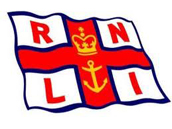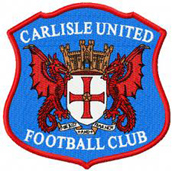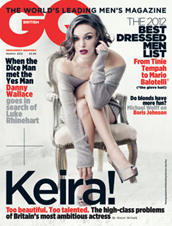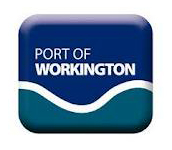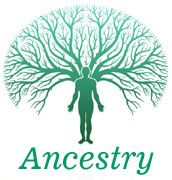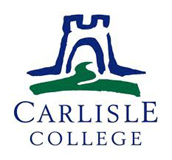- Home
- Scarrows
- Mariners
- Cumberland
- Miscellaneous
Thomas Scarrow Carlisle Councillor and Alderman 1836-1845
Thomas Scarrow was first elected councillor for the year of 1836. Elections would have been held in the November 1835, and declarations signed in November or December.
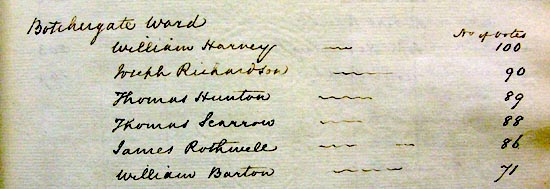 Council Elections were held every November, The image on the left, taken from the Council Minute Book, shows the results of the elections of 1835.
Council Elections were held every November, The image on the left, taken from the Council Minute Book, shows the results of the elections of 1835.
Thomas Scarrow's Declaration and Oath for Councillor 1835
The image below shows the oath signed by Thomas Scarrow in 1935. Each year, all the councillors, including the Mayor, would have to sign these declarations.
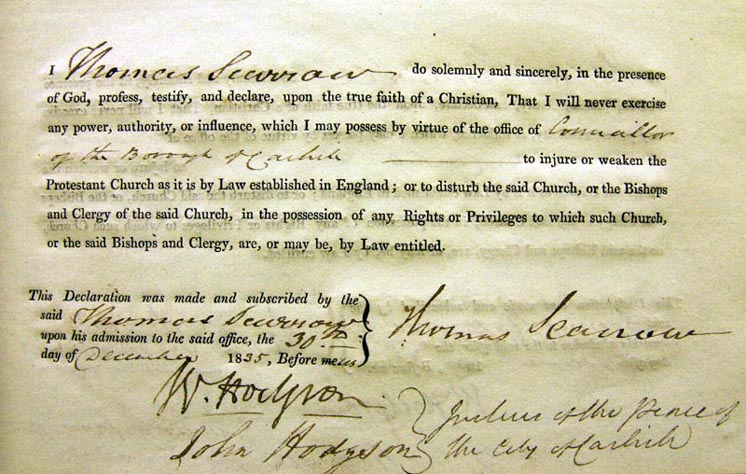
Thomas served on the Watch Committee from 1836 to 1844, and made occasional appearance in other committees during this time: Bay Committee in 1836; Lighting Committee in 1839.
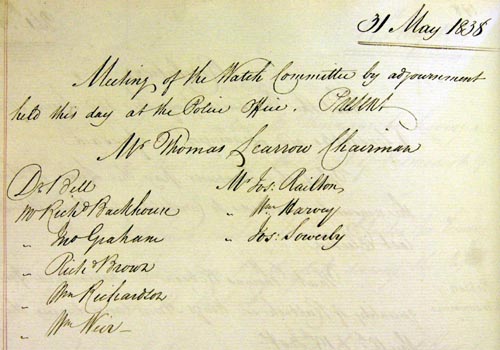 The image on the left records the meeting of the Watch Committee in 1838, with Thomas Scarrow as chairman. Also present were Richard Backhouse, Thomas Graham, Richard Brown, William Richardson, William Weir, Thomas Railton, William Harvey and Thomas Sowerby.
The image on the left records the meeting of the Watch Committee in 1838, with Thomas Scarrow as chairman. Also present were Richard Backhouse, Thomas Graham, Richard Brown, William Richardson, William Weir, Thomas Railton, William Harvey and Thomas Sowerby.
Thomas Scarrow's Declaration and Oath for Alderman 1838
Thomas was elected an Alderman in 1839, a position he held until 1844. His declaration, made in November 1838, is shown below. The position of Mayor was chosen by nomination, and was typically one of the previous years Aldermen.
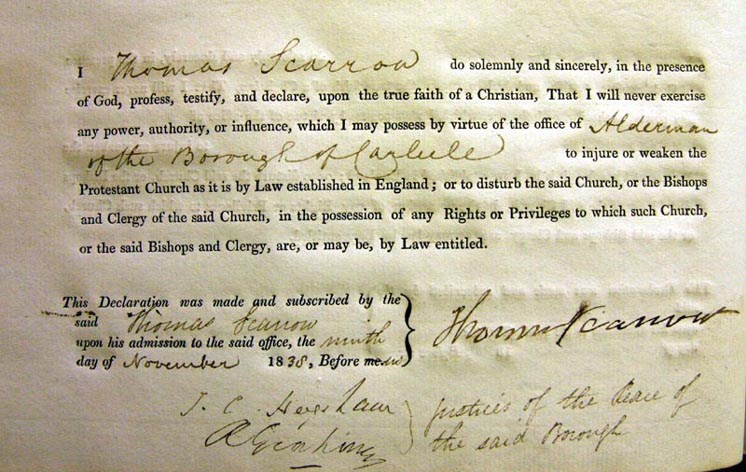
In November 1844, the year that James Steel was elected mayor, Thomas stood down from his position of Alderman, but served for one more year as a councillor, though not very actively, before retiring from the council sometime in 1845.
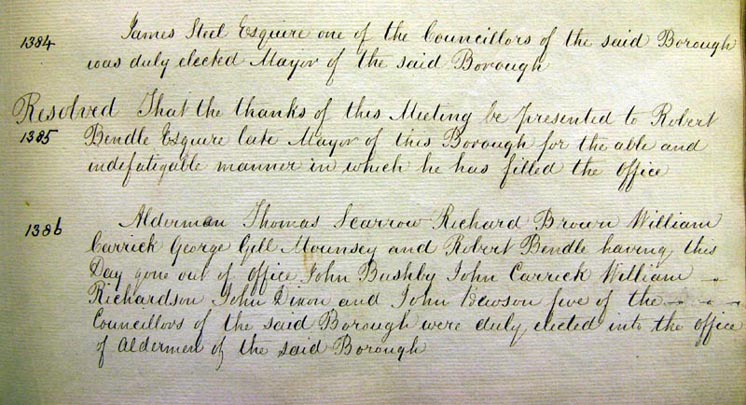
The transcripts below from the Carlisle Patriot give some background to the election of James Steel as Mayor at the end of 1844. He was not a popular choice with the paper's editor, which may in part have been due to his position as editor of the rival newspaper, the Carlisle Journal. However, that a statue to him was subsequently erected in 1859, and the fact that he served, unusually, two consecutive years as mayor, is testament to his ultimate popularity.
CARLISLE PATRIOT, Friday, October 25, 1844, Borough of Carlisle Council #1
Borough of Carlisle.
An account of the attendance of each member of the Council of the said Borough at the different meetings of the said Council from the 9th Nov 1843 to the 24th Oct 1844, inclusive:
Of the two figures next to each name, the first figure is for meetings attended, the second for meetings missed.
| MAYOR | COUNCILLORS | COUNCILLORS |
| Robert Bendle 12 2 | Joseph Iredale 12 2 | Henry Tweddle 6 8 |
| William Randleson 4 10 | John Huthart 9 5 | |
| ALDERMEN | Thomas Halstead 0 14 | John Wallace 8 6 |
| Thomas Scarrow 4 10 | Thomas Sheffield 9 5 | Ellwood Brockbank 11 3 |
| Richard Brown 7 7 | John Irving 7 7 | Edward Gaggs Castle 6 9 |
| William Carrick 8 6 | John Brown 7 7 | James Mounsey 0 14 |
| George Gill Mounsey 0 14 | John Dixon 6 8 | Joseph Sowerby 1 13 |
| James M'Cutcheon | William Stordy 10 4 | Robert Atkinson 5 9 |
| William R. Martindale 8 6 | William Gibbons 12 2 | John Carrick 6 8 |
| George Dixon 4 10 | William Cannell 13 1 | William Richardson 10 4 |
| George Relph 10 4 | William Barton 3 11 | William Weir 9 5 |
| John Bushby 6 8 | Joseph Rome 8 6 | |
| Joseph Lonsdale 3 11 | George Robinson 4 10 | |
| James Steel 9 5 | James Gilkerson 7 7 | |
| William Moss 9 5 | John Hewson 7 7 |
The undermentioned Councillors go out by rotation:
Botchergate Ward: Joseph Iredale William Randleson
Caldewgate Ward: Thomas Halstead Thomas Sheffield
Saint Cuthbert's Ward: John Irving John Brown
Saint Mary's Ward: John Dixon William Stordy
Rickergate Ward: William Gibbons William Cannell
Councillors going out of Office by rotation are re-eligible.
An Account of the Attendance of the Members of the Committees of the Council of the said Borough, at the different Meetings of the said Committees, during the year ending the 24th Oct 1844:
| WATCH COMMITTEE | REPAIRS COMMITTEE | LIGHTING COMMITTEE |
| 51 Meetings | 25 Meetings | 12 Meetings |
| The Mayor 31 | The Mayor 12 | Joseph Sowerby 0 |
| Thomas Scarrow 20 | Joseph Richardson 6 | William Randleson 2 |
| James Mounsey 10 | William Barton 5 | Thomas Halstead 1 |
| John Bushby 37 | William Carrick 10 | James M'Cutcheon 2 |
| William Weir 32 | Robert Atkinson 11 | Henry Tweddle 6 |
| John Irving 31 | Thomas Sheffield 19 | William Richardson 12 |
| W. R. Martindale 20 | James Steel 10 | George G. Mounsey 0 |
| John Carrick 33 | George Dixon 9 | George Dixon 5 |
| Joseph Lonsdale 30 | George Robinson 10 | Edward C. Castle 0 |
| William Moss 41 | Ellwood Brockbank 19 | John Hewson 9 |
| John Wallace 12 | James Gilkerson 19 | |
| William Stordy 8 | FINANCE COMMITTEE | |
| William Cannell 42 | 14 Meetings | |
| William Gibbons 36 | The Mayor 4 | |
| Joseph Rome 14 | Joseph Iredale 11 | |
| John Brown 7 | ||
| Richard Brown 3 | ||
| John Huthart 9 | ||
| George Relph 12 |
The Mayoralty of Carlisle. Carlisle Patriot, Friday, November 15, 1844
The ordinary amusement provided for the inhabitants of Carlisle by the annual difficulty of the Corporation to find any person, however remotely qualified, who will accept the Mayoralty at their hands, was considerably enhanced at the election on Saturday last. At first, indeed, everything promised well. Mr. Bendle, who had been put into office for that express purpose, had in some measure filled up the gap between the wealthier, and, by position, more respectable leaders of the Whig-radical faction, who had long monopolized the civic chair, and the ice was broken for the smaller fry of the Corporation to attain such distinction as it now affords, when it was convenient to allow them to do so. Their vanity being gratified so far, an effort was made to render the gradation from Mr. Bendle to the Councillors at large as little marked as possible.
It admitted that Messrs. Steel, Scarrow, Lonsdale, Beeby Saul, &c., had a perfect right, and were in fact eligible to the office, but still it was considered desirable that for another year at least, it should be filled by some one of greater pretensions to preside over their fellow-townsmen, and therefore it was that Mr. Stordy was openly named as the Mayor elect. All then "Went merry as a marriage bell". To Mr. Stordy there certainly was as little objection as to any of the party with which he is politically connected, and his election would have at least passed without remark, if it did not meet with the approval of all classes. But alas, for the tactician who manage the corporation! Mr. Stordy was at the time virtually disqualified from serving the office. Whoever fills it must take and administer oaths, or at all events act upon oaths administered, and Mr. Stordy, having been through life a consistent member of the Society of Friends, entertains conscientious scruples upon this point. At the eleventh hour, therefore, they found that they had reckoned without their host, and when that gentleman was asked, he positively declined accepting the Mayoralty.
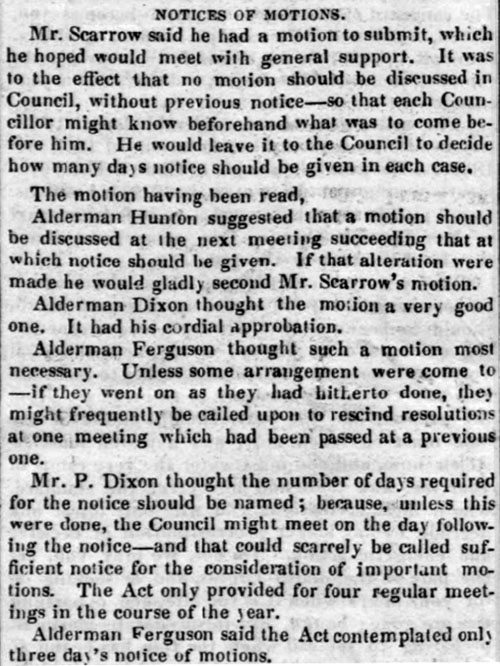 Mr. Bendle returned thanks, he said - Mr. Mayor and gentlemen: I feel highly indebted to you for the kind manner I have been spoken of by Mr. Rome, and Mr. Cannell, followed up by Mr. Steel. I think they have given too flattering an account of my works during the last twelve months; but I believe the proposition of Mr. Rome was cordially agreed in. It was my anxious desire on accepting office, to discharge its duties so as to give satisfaction; if I have done so, I am amply rewarded for my trouble. I am obliged to you for the election of Mr. Steel, because I am satisfied the duties of mayor will be performed efficiently. The last twelve months was a time of peace; and there is nothing to regret except the accident at Guard House; I will allude to it as it has been taken up in the newspapers. I defy any man to say that the Corporation could be blamed for that event. The man, who made the remark, passed the chimney every day; he was a public man, and had his paper at command, and should have pointed it out if he considered it dangerous; so that if an accident occurred he, of all others, was to blame! To show you that the corporation was not to blame, I may mention that I had a vote of thanks from his friends for the attention paid to the gentleman! I must thank the council for the assistance they gave, and the attention they always paid, and I have no doubt but they will act as cordially with Mr. Steel. I may just remark, as there are several of the working classes here, that when I entered office they were fully employed; and now they are not only fully employed, but better paid for their work. It is a source of gratification to me, and I thank you.
Mr. Bendle returned thanks, he said - Mr. Mayor and gentlemen: I feel highly indebted to you for the kind manner I have been spoken of by Mr. Rome, and Mr. Cannell, followed up by Mr. Steel. I think they have given too flattering an account of my works during the last twelve months; but I believe the proposition of Mr. Rome was cordially agreed in. It was my anxious desire on accepting office, to discharge its duties so as to give satisfaction; if I have done so, I am amply rewarded for my trouble. I am obliged to you for the election of Mr. Steel, because I am satisfied the duties of mayor will be performed efficiently. The last twelve months was a time of peace; and there is nothing to regret except the accident at Guard House; I will allude to it as it has been taken up in the newspapers. I defy any man to say that the Corporation could be blamed for that event. The man, who made the remark, passed the chimney every day; he was a public man, and had his paper at command, and should have pointed it out if he considered it dangerous; so that if an accident occurred he, of all others, was to blame! To show you that the corporation was not to blame, I may mention that I had a vote of thanks from his friends for the attention paid to the gentleman! I must thank the council for the assistance they gave, and the attention they always paid, and I have no doubt but they will act as cordially with Mr. Steel. I may just remark, as there are several of the working classes here, that when I entered office they were fully employed; and now they are not only fully employed, but better paid for their work. It is a source of gratification to me, and I thank you.
Mr. Thomas Sheffield, the dentist, then rose, and each one seemed to wonder what he was going to speak about. He said with regard to the melancholy business alluded to by Mr. Bendle, he had been reading an account of that fatal accident, and he might state that the council, with a laudable zeal, immediately set about to have the nuisance removed. - (Hear, hear.)
This terminated the business of the Council as to the election of Mayor, and the Councillors then proceeded to elect Aldermen in the room of those going out in rotation. The result was as follows:
Botchergate Ward-
Mr. John Bushby in the room of Mr. Thomas Scarrow.
Caldewgate Ward.
Mr. John Carrick in the room of Mr. Brown (Brewer).
St. Cuthbert's Ward.
Mr. William Richardson, in the room of Mr. William Carrick.
St. Mary's Ward.
Mr. John Dixon, in the room of Mr. G. G. Mounsey.
Rickergate Ward.
Mr. John Hewson, in the room of Mr. Robert Bendle.
Carlisle Town Council - Election of Mayor. Town Hall, Nov. 9, 1844.
The Council met a little before 12 o'clock this morning, for the purpose of electing a chief magistrate for the ensuing year, in compliance with the terms of the Municipal Reform Bill. The election of Mayor is always a humiliating circumstance to the council, inasmuch as they are ever obliged to use the most abject entreaties to induce any of the three or four members of their body who are decently qualified, to accept the office. On this occasion their difficulties were greatly aggravated by the fact that up to the eleventh hour they relied upon a sort of reluctant assent given by Mr. William Stordy, to their reiterated solicitations that he should act in the capacity of Mayor. That gentleman being a member of the Society of Friends, found, on inquiry, that his religious scruples about the propriety of administering an oath practically disqualified him for the office; and no bees that had lost their queen ever exhibited half the dismay or confusion evinced by the worthy councillors of Carlisle at thus being "taken aback". A Mayor, however, was indispensible, and they met as usual, secretly in the Mayor's parlour, to endeavour to persuade someone to act. Long and solemn was their consultation, amusingly diversified, as we understand, by the sophistries with which Mr. Sheffield vainly attempted to overcome the scruples of Mr. Stordy; but the difficulties of the council will be best understood from the fact that at last the Corporation returned to the Town Hall, and with great apparent exultation and unanimity, elected Mr. James Steel, of the 'Journal Office', as chief magistrate of Carlisle!!
Mr. W. Richardson made the formal motion for the election, and in doing so could not suppress his smiles. He said, addressing Mr. Bendle, who had taken his seat for the last time, heralded by the Mayor's sergeants bearing seal and mace, Mr. Mayor, the first duty we have to perform is to make choice of a successor to fill that chair which you have filled so ably, and I have great pleasure in nominating a gentleman who I hope, and am sure, will give every satisfaction -- that is, Mr. James Steel. [Here the councillors looked at each other with an uncomfortable sort of acquiescence, and Mr. John Irving cried "hear, hear."] I hope, continued Mr. Richardson, that his health will be spared to him so as to enable him to attend to his duties, and I have great pleasure in supporting him.
Mr. Ellwood Brockbank then said -- I have much pleasure in seconding the proposition made for the appointment of Mr. Steel, as Mayor of this city. I have known him long - not only as a public man, but as a private friend; and it affords me peculiar satisfaction to second the motion. I have no doubt but he will fill the office with credit to himself and benefit to the public. [Here the councillors looked at each other, and seemed to think this sounded well, so they applauded MR. Brockbank's confidence in his friend.]
Mr. Bendle, with the greatest simplicity and admirable self-command, as if there had been no previous arrangement in the Mayor's parlour, then asked "has any other member a proposition to make; if not, it is my duty to put the motion before us to the vote?"
A well-acted pause ensued; and if it had not been for the covert smile that would interfere with the gravity of some of the councillors, a spectator, not in the secret, might have fancied the question was seriously put, but there was no rival candidate, and the question having been put, Mr. Steel was declared to have been elected "unanimously", amidst the applause of the council.
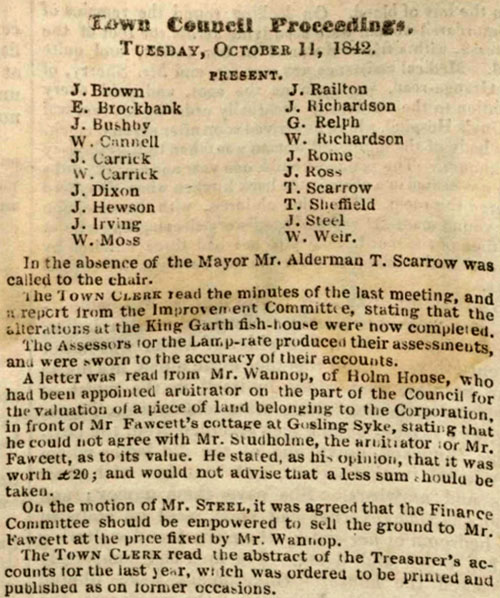 In reference to Mr. Steel's fitness for the office, we shall at present say nothing. Many may think that as an avowed party man, and the conductor of a newspaper remarkable chiefly for its abuse of the liberty of the press in the violation of the privacy of domestic life, and the gross personal abuse of all who do not reverence his faction -- that individual had the best possible excuse for declining the office, to the respectability of which he makes no addition; but as far as the public are concerned the choice of the Corporation is of the least possible consequence.
Whoever may be the party called upon to fill the chair when it is vacant, it is notorious that Mr. Steel will still, as hitherto, pull the wires by which he has regulated the municipal 'Fantoccini' since the Corporation passed into the hands of the 'clique' who at present hold it; and in substituting the mountebank for the puppet there will be no perceivable change in its operations.
Time was when access to the Corporation of Carlisle was considered an honour -- now it is little short of a disgrace.
In reference to Mr. Steel's fitness for the office, we shall at present say nothing. Many may think that as an avowed party man, and the conductor of a newspaper remarkable chiefly for its abuse of the liberty of the press in the violation of the privacy of domestic life, and the gross personal abuse of all who do not reverence his faction -- that individual had the best possible excuse for declining the office, to the respectability of which he makes no addition; but as far as the public are concerned the choice of the Corporation is of the least possible consequence.
Whoever may be the party called upon to fill the chair when it is vacant, it is notorious that Mr. Steel will still, as hitherto, pull the wires by which he has regulated the municipal 'Fantoccini' since the Corporation passed into the hands of the 'clique' who at present hold it; and in substituting the mountebank for the puppet there will be no perceivable change in its operations.
Time was when access to the Corporation of Carlisle was considered an honour -- now it is little short of a disgrace.
Whatever the conduct of an individual may have been, he is seldom, in consequence, disqualified or deemed ineligible for the Town Council. If a man be read out of or dismissed from all connection with any respectable class of society, he is almost sure to be elected one of the Corporation; and as according to Mr. Steel's principles, the Mayor, Aldermen, and Council are all equal, it will happen that they must dredge up the mud from the bottom to the top. Each in turn fills the highest or the lowest place as chance may regulate, where worth has no pre-eminence. A Dixon or a Mounsey is Mayor one day - the next a common Councillor - succeeded and presided over by a Scarrow, a Beeby Saul, or a Steel. "Jack is as good as his master"; and if one day "he goes "up, up, up" on another, "he goes down, down, down" until again fished up by the dredging process from the lowest depths.
Now, however, we should not wonder to see a change in this respect. By virtue of the principles he insisted on, and the extreme exigencies of the Corporation, Mr. Steel has obtained the Mayoralty, and may probably endeavour to keep the office select. It has reached him, and he has an interest in preventing it going still lower. We last year foretold that he would succeed Mr. Bendle; next year his pride may require that he may be succeeded by a Mounsey or a Dixon. 'He that has but impudence to all things has a fair pretence'.
Mr. Steel is not deficient in this respect; and after his mayoralty, he may think it worthwhile to attempt to keep "the gilding on the gingerbread", and bring the reflection of respectability to the tarnished chair. At all events, it would be well to remove from the office of chief magistrate of Carlisle, the odious imputation that a gentleman, having a conscience, cannot discharge its duties; and that none can be found to accept it but those who are actually in the service of, or otherwise dependent upon, the faction who elect the Corporation.
In this dull season our readers will excuse our having dwelt so long upon this farce of "High life below stairs", but we cannot dismiss the proceedings of Saturday without saying a word to Mr. Bendle. The late Mr. Mayor in utter want of a subject upon which to remark in leaving office, thought proper to honour us with his especial notice. He intimated that we had blamed the Corporation for the late fatal accident at the Old Guard-house, and asserted we were to blame ourselves for not having noticed the unfortunate projection of the chimney before! In reply we can only say that if Mr. Bendle will be at the trouble to read the remarks in the "Patriot' upon that particular occasion, in addition to a great deal of other information that he might profit by, he will learn that he made a very foolish speech as a finish to his Mayoralty - based not upon our observations, but upon the misrepresentations of the "Journal".
We did not blame the Corporation particularly for that accident, and we gave them as much credit as Mr. Sheffield has done for the immediate removal of the nuisance; but we did and do blame the authorities of Carlisle, for their guilty neglect of the convenience of the inhabitants, in making no provision for the greatly increased traffic of the town - especially at the spot where that accident took place; and we shall never feel that they are properly discharging their duties to the public until they do so.
As to the absurd pretence that we were equally responsible with the Corporation, because we did not notice the objectionable protrusion of the chimney before - we need only say, it is a brilliant "extravaganza" of Mr. Bendle himself, possibly originating in his want of something better to say, but certainly requiring no comment. We bestow, from time to time, a great many useful suggestions upon the Corporation, which they are very slow in taking advantage of; and it is rather cool on their part to complain now of what we have not suggested.
George Saul, Esq., of Brunstock, was then in attendance, before whom Mr. Steel took the usual declarations, &c., the principal of which the new mayor got through with an emphasis that appeared to surprise Mr. Brockbank and some others who have know him "as a public man and in private". We subjoin it for the consideration of all loves of consistency:
" I, James Steel, do solemnly, and sincerely, in the presence of God, profess, testify, and declare, upon the true faith of a Christian, that I will never exercise any power, authority, or influence which I may possess by virtue of the office of Mayor of the Borough of Carlisle, to injure or weaken the Protestant Church as it is by law established in England; or to disturb the said Church, or the Bishops and Clergy of the said Church, in the possession of any rights or privileges to which such Church, or the said Bishops and Clergy, as, or may be, by law entitled."
Mr. Bendle then formally vacated his seat, which Mr. Steel immediately occupied - his nominators duly applauding. The newly-elected Mayor then rose, and said, (making a prudent distinction) -- Gentlemen and Councillors:
I appear here certainly in an unexpected situation. The office is one I have not coveted nor sought, for it has been in some degree forced upon me; but I accept it at the same time with a full appreciation of the honour done me. Having held opinions of a particular kind, on which this Corporation has acted since its first establishment, that every man elected by the whole burgesses should accept any office his fellow-townsmen might throw on him, I could not conscientiously or honestly refuse to accept an office I was so unanimously requested to fill. I am but carrying out a principle I have advocated for many years, and on which I have argued with other friends to induce them to accept the office. It would have been gratifying to me if some other gentleman had accepted the office; but only one gentleman was named; and I think it due to that gentleman to state one or two circumstances connected with his declining to act.
It is generally known that Mr. Stordy had agreed to fill the office, many of the Council being anxious he should do so. But circumstances arose yesterday which let him see that without violating conscientious scruples he could not accept it. As a Magistrate it would be his duty to administer oaths, and Mr. Stordy could not do that without violating the principles he has held through life, and which the Society [of Friends] to which he belongs holds of the highest importance; and therefore it would not be right to ask any man to forego the privileges of a society with which he has been so long connected. Then came the question, who should be the next person to succeed the late Mayor? The Council have done me the honour to elect me to the office, and I will do my best to discharge its duties faithfully. I have stated that as a party man and the conductor of a public newspaper, it may become a party object to fasten on the Council the holding of opinions for which they are not responsible.
It may be necessary to attack me through that body, but with a full knowledge of this they have chosen to elect me; and having done so, I will endeavour to discharge its duties in such a manner, that at the end of the year they may not be ashamed of electing me as their chief officer.
I might detain you a long time; but seeing so many gentlemen around me, I will say no more, but proceed at once to the business of the day; and first, it will be necessary to choose five aldermen to supply the place of those going out.
The retiring aldermen are Mr. Scarrow, Mr. Brown, Mr. Wm. Carrick, Mr. G. G. Mounsey, and Mr. Robert Bendle.
Mr. Rome, draper, said -- There is a debt we owe to our late chief magistrate, which should be paid before other business is proceeded with. We have all been glad that he has presided over us for the last twelve months, and all of us must be glad that we have had such a man to fill the office. I say, Mr. Bendle has given satisfaction to all parties and classes; he has been as disinterested a Mayor as ever sat of the Bench. Amongst all with whom I have conversed, Mr. Bendle has been spoken of in a way which must be pleasing to himself, and gratifying to his friends. I will not take up your time, but beg to propose a vote of thanks to Mr. Bendle, for his very efficient services during the last year.
Mr. Cannell, said, he cordially agreed in all that had been said by Mr. Rome, and had much pleasure in seconding the vote of thanks.
The New Mayor said - Before putting this resolution, allow me to say a few words in addition to what has been so well said by Mr. Rome. I have watched the proceedings of Mr. Bendle for the last twelve months with care, and I am sure I will be uncontradicted in saying, that no man ever discharged the duties of chief magistrate with greater efficiency than Mr. Bendle has done (Applause.) The motion was then put and carried.
On Wednesday, the election of Councillors in the place of the newly-elected Aldermen, took place in all the wards, when the out-going aldermen were severally re-elected as Councillors for their respective wards. A smart contest took place in Botchergate Ward, Mr. Burgess, iron-founder, having been nominated in opposition to Mr. Scarrow, but no previous preparation had been made on the part of the supporters of Mr. Burgess, so that at the close, Mr. Scarrow was returned by a majority of 14 votes.
Morning News Hints for the Corporation.
We noticed last week that the Ex-Mayor Mr. Bendle, thought proper to hold us responsible for not having informed the Corporation of a nuisance that, he believed, must have fallen under our observation. Lest his successor in office should require the assistance of which it appears Mr. Bendle felt the want so much, we beg to direct the attention of His Worship -
1. To the disgusting and permanent nuisance so long permitted in the accumulation of most offensive offal, &c., &c., close to the high road leading to Botcherby, in the fields occupied by Mr. Alderman Scarrow. It ought to have been indicted long since, and surely it is especially the duty of the Corporation to insist upon its removal, as it literally pollutes the air of the neighbourhood through which runs one of the driest and most favourite walks about Carlisle.
The next page about Thomas Scarrow Jnr deals with his occupation as an innkeeper. To view this page, click here.

